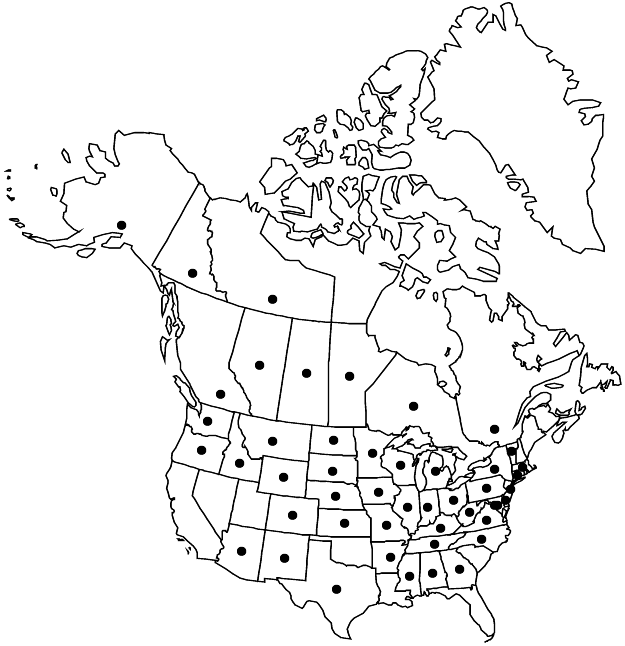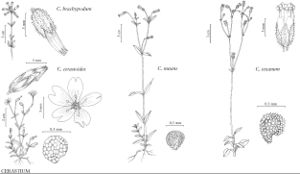Difference between revisions of "Cerastium nutans"
Précis Découv. Somiol., 36. 1814.
FNA>Volume Importer |
RevisionBot (talk | contribs) m (Bot: Adding category Revised Since Print) |
||
| (5 intermediate revisions by 3 users not shown) | |||
| Line 8: | Line 8: | ||
}} | }} | ||
|common_names=Nodding mouse-ear chickweed;céraiste penché | |common_names=Nodding mouse-ear chickweed;céraiste penché | ||
| + | |special_status={{Treatment/ID/Special_status | ||
| + | |code=W | ||
| + | |label=Weedy | ||
| + | }}{{Treatment/ID/Special_status | ||
| + | |code=F | ||
| + | |label=Illustrated | ||
| + | }} | ||
|basionyms= | |basionyms= | ||
|synonyms= | |synonyms= | ||
| Line 17: | Line 24: | ||
}}<!-- | }}<!-- | ||
| − | --><span class="statement" id="st-undefined" data-properties=""><b>Plants </b>annual, slender, finely glandular-pubescent (often perennial and tomentose in < | + | --><span class="statement" id="st-undefined" data-properties=""><b>Plants </b>annual, slender, finely glandular-pubescent (often perennial and tomentose in <i></i>var.<i> obtectum</i>), with slender taproot. <b>Stems</b> erect, simple or branched at or near base, sometimes with straggling, nonflowering basal shoots, 10–50 cm, softly pubescent, often with a few long, flexuous, woolly hairs at proximal nodes, glandular and somewhat viscid distally; small axillary tufts of leaves usually absent. <b>Leaves</b> marcescent or not, sessile; blade oblanceolate to spatulate in proximal leaves, becoming lanceolate to linear-lanceolate in distal leaves, occasionally elliptic, 10–60 × 3–15 mm, apex acuminate to acute, softly pubescent and glandular, sometimes tomentose. <b>Inflorescences</b> rather open, 3–21(–40)-flowered cymes, ultimately widely branched; bracts herbaceous, lanceolate, glandular-pubescent. <b>Pedicels</b> ascending, sharply deflexed at apex in fruit, 5–20(–35) mm, usually 1–3 times as long as sepals in flower, elongating to 5 times as long as sepals in fruit, longer than capsules, glandular-pubescent and viscid. <b>Flowers</b>: sepals ovate-lanceolate, 4–6 mm, outer sepals herbaceous or with narrow margins, inner with margins ca. as wide as herbaceous center, apex broadly acute to obtuse, glandular-puberulent, hairs shorter than sepal tips; petals oblanceolate, sometimes absent, 3–6(–8) mm, shorter to 1.5 times longer than sepals, apex 2-fid; stamens 10; styles 5. <b>Capsules</b> cylindric, curved, (9–)10–12(–13) mm, 2–3 times as long as sepals; teeth 10, erect, margins convolute. <b>Seeds</b> golden brown, 0.5–0.8 mm diam., shallowly tuberculate; testa not inflated. <b>2n</b> = 34, 36.</span><!-- |
-->{{Treatment/Body | -->{{Treatment/Body | ||
| − | |distribution= | + | |distribution=Alta.;B.C.;Man.;N.W.T.;Ont.;Que.;Sask.;Yukon;Ala.;Alaska;Ariz.;Ark.;Colo.;Conn.;D.C.;Del.;Ga.;Idaho;Ill.;Ind.;Iowa;Kans.;Ky.;Mass.;Md.;Mich.;Minn.;Miss.;Mo.;Mont.;N.C.;N.Dak.;N.J.;N.Mex.;N.Y.;Nebr.;Ohio;Oreg.;Pa.;S.Dak.;Tenn.;Tex.;Va.;Vt.;W.Va.;Wash.;Wis.;Wyo.;Mexico. |
|discussion=<p>Varieties 2 (2 in the flora).</p> | |discussion=<p>Varieties 2 (2 in the flora).</p> | ||
|tables= | |tables= | ||
| Line 44: | Line 51: | ||
-->{{#Taxon: | -->{{#Taxon: | ||
name=Cerastium nutans | name=Cerastium nutans | ||
| − | |||
|authority=Rafinesque | |authority=Rafinesque | ||
|rank=species | |rank=species | ||
| Line 51: | Line 57: | ||
|basionyms= | |basionyms= | ||
|family=Caryophyllaceae | |family=Caryophyllaceae | ||
| − | |distribution= | + | |distribution=Alta.;B.C.;Man.;N.W.T.;Ont.;Que.;Sask.;Yukon;Ala.;Alaska;Ariz.;Ark.;Colo.;Conn.;D.C.;Del.;Ga.;Idaho;Ill.;Ind.;Iowa;Kans.;Ky.;Mass.;Md.;Mich.;Minn.;Miss.;Mo.;Mont.;N.C.;N.Dak.;N.J.;N.Mex.;N.Y.;Nebr.;Ohio;Oreg.;Pa.;S.Dak.;Tenn.;Tex.;Va.;Vt.;W.Va.;Wash.;Wis.;Wyo.;Mexico. |
|reference=None | |reference=None | ||
|publication title=Précis Découv. Somiol., | |publication title=Précis Découv. Somiol., | ||
|publication year=1814 | |publication year=1814 | ||
| − | |special status= | + | |special status=Weedy;Illustrated |
| − | |source xml=https:// | + | |source xml=https://bitbucket.org/aafc-mbb/fna-data-curation/src/2e0870ddd59836b60bcf96646a41e87ea5a5943a/coarse_grained_fna_xml/V5/V5_181.xml |
|subfamily=Caryophyllaceae subfam. Alsinoideae | |subfamily=Caryophyllaceae subfam. Alsinoideae | ||
|genus=Cerastium | |genus=Cerastium | ||
| Line 62: | Line 68: | ||
}}<!-- | }}<!-- | ||
| − | -->[[Category:Treatment]][[Category:Cerastium]] | + | --> |
| + | |||
| + | [[Category:Treatment]] | ||
| + | [[Category:Cerastium]] | ||
| + | [[Category:Revised Since Print]] | ||
Latest revision as of 17:05, 6 November 2020
Plants annual, slender, finely glandular-pubescent (often perennial and tomentose in var. obtectum), with slender taproot. Stems erect, simple or branched at or near base, sometimes with straggling, nonflowering basal shoots, 10–50 cm, softly pubescent, often with a few long, flexuous, woolly hairs at proximal nodes, glandular and somewhat viscid distally; small axillary tufts of leaves usually absent. Leaves marcescent or not, sessile; blade oblanceolate to spatulate in proximal leaves, becoming lanceolate to linear-lanceolate in distal leaves, occasionally elliptic, 10–60 × 3–15 mm, apex acuminate to acute, softly pubescent and glandular, sometimes tomentose. Inflorescences rather open, 3–21(–40)-flowered cymes, ultimately widely branched; bracts herbaceous, lanceolate, glandular-pubescent. Pedicels ascending, sharply deflexed at apex in fruit, 5–20(–35) mm, usually 1–3 times as long as sepals in flower, elongating to 5 times as long as sepals in fruit, longer than capsules, glandular-pubescent and viscid. Flowers: sepals ovate-lanceolate, 4–6 mm, outer sepals herbaceous or with narrow margins, inner with margins ca. as wide as herbaceous center, apex broadly acute to obtuse, glandular-puberulent, hairs shorter than sepal tips; petals oblanceolate, sometimes absent, 3–6(–8) mm, shorter to 1.5 times longer than sepals, apex 2-fid; stamens 10; styles 5. Capsules cylindric, curved, (9–)10–12(–13) mm, 2–3 times as long as sepals; teeth 10, erect, margins convolute. Seeds golden brown, 0.5–0.8 mm diam., shallowly tuberculate; testa not inflated. 2n = 34, 36.
Distribution

Alta., B.C., Man., N.W.T., Ont., Que., Sask., Yukon, Ala., Alaska, Ariz., Ark., Colo., Conn., D.C., Del., Ga., Idaho, Ill., Ind., Iowa, Kans., Ky., Mass., Md., Mich., Minn., Miss., Mo., Mont., N.C., N.Dak., N.J., N.Mex., N.Y., Nebr., Ohio, Oreg., Pa., S.Dak., Tenn., Tex., Va., Vt., W.Va., Wash., Wis., Wyo., Mexico.
Discussion
Varieties 2 (2 in the flora).
Selected References
None.
Key
| 1 | Leaves not marcescent, long, woolly pubescence confined to proximal nodes | Cerastium nutans var. nutans |
| 1 | Leaves tending to be marcescent, leaves and stem with long, woolly pubescence | Cerastium nutans var. obtectum |
